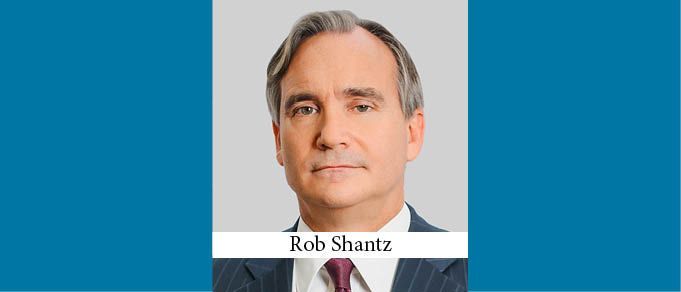Rob Shantz is a partner and the Head of the Corporate practice of Redcliffe Partners. He is a US-qualified lawyer with over 28 years of experience, including some 20 years in Central and Eastern Europe. Shantz specializes in cross-border corporate law and corporate governance matters, as well as in FCPA compliance investigation.
CEELM: Run us through your background, and how you ended up in your current role with Redcliffe Partners.
R.S.: After practicing law in the US for over seven years, I came to Poland in 1995 with the Peace Corps. Following the Peace Corps, I ricocheted between PwC and KPMG: PwC in Warsaw from 1996-1999; KPMG in Bucharest from 1999-2001; KPMG in Kyiv from 2001-2010, where I was a Tax and Legal Partner; and PwC in Kyiv from 2011 until 2015, where I was a Partner and Head of the Legal Department. I joined Redcliffe Partners in December, 2015. I much enjoy living in Kyiv, and the common theme is that I changed firms rather than rotate from Ukraine. Joining Redcliffe Partners was particularly convenient – we’re in the same building as PwC, so I even have the same parking spot!
CEELM: Was it always your goal to work abroad?
R.S.: No. I never even considered moving abroad until a girl that I was dating joined the Peace Corps. After several years of practicing with a large US law firm, a change sounded good, and it seemed that I had little to lose – if Peace Corps didn’t work out, I’d return to the US and pick up where I left off. It turned out to be one of the best choices of my life (except with respect to the girl – she was sent to Ecuador, and I was sent to Poland …).
CEELM: Tell us briefly about your practice, and how you built it up over the years.
R.S.: My practice consists of advising on and leading Corporate and M&A projects. Recently, I’ve also been very involved with our growing Compliance practice – particularly relative to FCPA and personal data protection issues. Recent clients include IT companies (relating to structuring cross-border provision of software development services and to implementing global personal data protection procedures) and Energy firms (relating to a Ukrainian acquisition and to assessing and updating/improving certain internal policies and procedures).
When considering how to build a practice, I like the quote attributed to Woody Allen that “90% of success is just showing up.” That’s a bit simplistic, but there is something to be said for “showing up” and putting in the effort over an extended period of time to give great service to current clients, and to stay active to meet new clients.
CEELM: What do your clients appreciate most about you?
R.S.: Given my past experience with Big Four firms, I’m very comfortable with tax issues, and I think that it’s helpful and appreciated that I can consider these issues while addressing various corporate and/or M&A implications. Also, having worked in a number of different jurisdictions helps me to bring a very practical perspective to cross-border transactions. It’s further very important to me that we do all that we can to add value by solving problems with clear and direct solutions and recommendations (as opposed to a seeming regional, historical tendency to sometimes just answer the specific question posed – even if clearly erroneous or incomplete – with lengthy and ambiguous responses).
But probably what is most appreciated is that I sometimes procrastinate and am slow to issue invoices …
CEELM: Do you find Ukrainian clients enthusiastic about working with foreign lawyers, or – all things considered – do they prefer working with local lawyers?
R.S.: My experience is that Ukrainian clients are like most other clients – they want good service for good value – and they are generally happy to work with foreign lawyers if the commercial terms are satisfactory. The perception, though, is that foreign-oriented firms are expensive, so Ukrainian clients tend to work with local lawyers for purely domestic issues, but are more likely to consider working with foreign lawyers when they have issues with cross-border implications.
CEELM: There are obviously many differences between the Ukrainian and American judicial systems and legal markets. What idiosyncrasies or differences stand out the most?
R.S.: One broad difference that comes to mind is that issues here can be less predictable, particularly with respect to interaction with the courts and authorities. This is why many of the transactions that we work on are governed by English or other non-local law, and provide for disputes to be adjudicated outside of Ukraine. A difference in Ukraine’s favor is that the tax laws are generally simpler than the monstrosity of the US tax code. As one former US Senator put it: “The present tax code is about ten times longer than the Bible, a lot more complicated, and, unlike the Bible, contains no good news.”
CEELM: How about the cultures? What differences strike you as most resonant and significant?
R.S.: As compared to my life in the US, I often say that in Ukraine the highs are higher, the lows are lower, but it’s never boring! The last fifteen years or so have been an exciting time to live in Ukraine. I’ve been in Ukraine through both the Orange Revolution and Euromaidan, and I’m very impressed by the efforts and energy of the many Ukrainians who want their country and its institutions to become more fair and transparent. I’m less impressed with many in the political class, and their corrupt, entrenched interests and schemes. There is real progress and the economy is growing again, but, with a little more political will and foresight, Ukraine could be - and hopefully soon will be – a real growth tiger.
CEELM: What particular value do you think a senior expatriate lawyer in your role adds – both to a firm and to its clients?
R.S.: It’s kind of sneaked up on me, but I guess that I’ve become the proverbial (partially) gray-haired partner. Redcliffe Partners is a young firm with much energy and enthusiasm, and many very clever (and very nice) attorneys. I’m happy that my experience is sometimes helpful for internal issues like procedures and processes, as well as to occasionally provide additional input and perspectives on important client projects that other partners are leading.
CEELM: Outside of Ukraine, which CEE country do you enjoy visiting the most, and why?
R.S.: This is a difficult question. I have two British friends from my Warsaw days, and, while we’re all currently living in different countries, we still try to meet at least once a year. This has been the case for close to twenty years now, and, since our meetings tend to rotate between different CEE countries, I’ve been very fortunate to visit many interesting, beautiful, and historic places in the CEE … and a fair number of pubs and taverns. If I have to choose, though, I still have a special fondness for Poland – it was the first foreign country that I lived in, and, with the excellent Peace Corps language training, I was able to learn Polish. It’s always a nicer experience when you can speak the local language.
CEELM: What’s your favorite place to take visitors in Kyiv?
R.S.: Kyiv is a wonderful city, so, again, a difficult question. The luckier visitors come in periods of warmer weather, in which event my two favorite options are one of the many rooftop terraces (for example, at the Hyatt, Intercontinental, and Avalon, among others), which have panoramic views of gorgeous, ancient churches and/or Dnipro River; or one of the many open air cafes in the city center (such as O’Panas, Chateau, and Chicken Kyiv) which make for good people watching.
This Article was originally published in Issue 4.9 of the CEE Legal Matters Magazine. If you would like to receive a hard copy of the magazine, you can subscribe here.

















